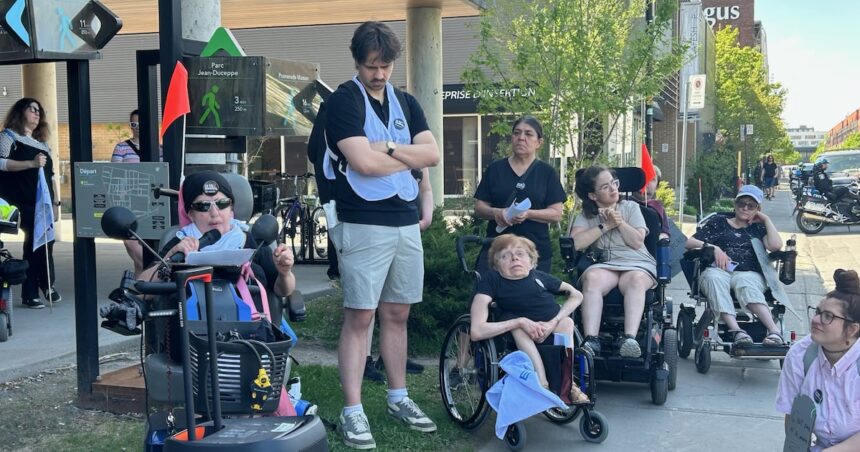I witnessed a poignant scene yesterday that speaks volumes about our city’s ongoing struggle with accessibility and dignity. As rain fell across downtown Montreal, more than 60 disability rights activists gathered for what they called a “funeral march” – a powerful symbolic protest highlighting the “death of autonomy” many people with disabilities face daily.
The demonstration, organized by RAPLIQ (Regroupement des activistes pour l’inclusion au Québec), moved slowly along Sainte-Catherine Street. Participants dressed in black, some carrying mock coffins and tombstones, created a striking visual metaphor for their message.
“We’re burying our autonomy today because the government continues to ignore our basic rights to move freely through our own city,” explained Marie-Eve Veilleux, a longtime RAPLIQ activist I’ve interviewed several times over my years covering Montreal’s accessibility movement.
The timing wasn’t coincidental. This protest marked the 15th anniversary of Quebec’s adoption of accessibility legislation that many activists describe as “toothless” and “ineffective.” The province’s 2004 disability law lacks enforcement mechanisms and concrete timelines, creating what protesters call a perpetual state of “planning without action.”
What struck me most while watching the procession was the diversity of participants. I spotted wheelchair users, people with visual impairments using white canes, families with children who have developmental disabilities, and many allies without disabilities marching in solidarity.
Several participants shared stories that illustrate their daily reality. Michel Dupuis, a wheelchair user from Rosemont, described how he routinely must plan trips days in advance, researching which metro stations have elevators and which businesses he can actually enter.
“I can’t spontaneously meet friends for dinner or shopping like everyone else,” Dupuis told me. “That’s what we mean by the death of autonomy – losing the freedom to make basic choices.”
The statistics supporting their frustration are stark. According to the Société de transport de Montréal (STM), only 19 of Montreal’s 68 metro stations currently have elevators – about 28 percent. This lags significantly behind other Canadian cities like Toronto and Vancouver.
Beyond transit, protesters highlighted how many businesses remain inaccessible despite the existing legislation. A 2022 survey by the Quebec accessibility group Ex-aequo found that approximately 43 percent of restaurants and retail shops in central Montreal still have entrance steps with no ramps or alternative access.
The demonstration ended at Place Émilie-Gamelin, where organizers staged a mock funeral service. Community leaders read testimonials from people with disabilities who’ve experienced discrimination or exclusion.
“What we’re mourning today is the consistent failure of our society to recognize our humanity,” said Laurent Morissette, president of RAPLIQ. “Accessibility isn’t charity – it’s a fundamental right.”
I noticed several city councillors observing the protest, including Dominique Ollivier, who chairs Montreal’s executive committee. When approached for comment, Ollivier acknowledged the city’s shortcomings but pointed to the recently adopted Montreal Accessibility Plan, which promises to accelerate improvements to public infrastructure.
“We understand the frustration and are committed to doing better,” Ollivier said. “The new plan includes mandatory timelines and specific funding allocations.”
However, many protesters remained skeptical. The office of Quebec’s Minister Responsible for Social Services, Lionel Carmant, provided a statement emphasizing that $45 million had been allocated for accessibility initiatives in the most recent provincial budget.
But for demonstrators like Sophie Villeneuve, who uses a motorized wheelchair, past promises have rarely translated into meaningful change.
“I’ve heard these commitments my entire adult life,” Villeneuve said. “Meanwhile, I still can’t use most of the metro, enter many stores, or find accessible housing without extraordinary effort.”
As someone who’s covered Montreal news for over a decade, I’ve seen how our city’s unique architecture – with its iconic exterior staircases and historic buildings – presents real challenges for accessibility. Yet other cities with similarly historic infrastructure have made greater progress.
The protest’s message extends beyond physical barriers. Participants also highlighted issues like employment discrimination, inadequate support services, and the isolation that results from systemic exclusion.
As the demonstration disbanded, organizers announced plans for monthly actions until concrete progress is made. Their immediate demands include the implementation of accessibility standards with clear deadlines and penalties for non-compliance.
Watching Montrealers with disabilities fight so passionately for their basic rights to participate in city life left me reflecting on what kind of community we truly want to build. The question isn’t whether we can create a more accessible Montreal – it’s whether we have the collective will to make it happen.







